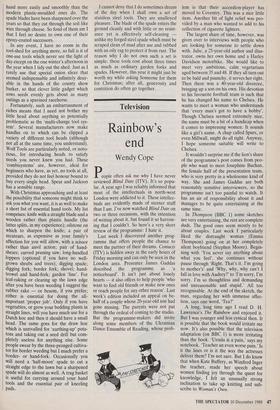Television
Rainbow's end
Wendy Cope
People often ask me why I have never reviewed Blind Date (ITV). It's so popu- lar. A year ago I was reliably informed that most of the intellectuals in north-west London were addicted to it. These intellec- tuals are evidently made of sterner stuff than I am. I've now watched Blind Date on two or three occasions, with the intention of writing about it, but found it so harrow- ing that I couldn't. So here's a very short review of the programme: I hate it.
Last week I discovered another prog- ramme that offers people the chance to meet the partner of their dreams. Contacts (ITV) is hidden away in the early hours of Friday morning and can only be seen in the London area. Presenter James Gaddas described the programme as 'a noticeboard'. It isn't just about lonely hearts — it also offers to help people 'who want to find old friends or make new ones or reach people for any other reason'. Last week's edition included an appeal on be- half of a couple whose 20-year-old son had gone missing. The parents were not put through the ordeal of coming to the studio. But the programme-makers did invite along some members of the Ukrainian Dance Ensemble of Reading, whose prob- lem is that their accordion-player has moved to Coventry. This was a nice little item. Another bit of light relief was pro- vided by a man who wanted to add to his collection of cigarette lighters.
The largest share of time, however, was given over to interviews with people who are looking for someone to settle down with. Julie, a 25-year-old author and illus- trator, owns her own home and a Harley Davidson motorbike. She would like to meet very ambitious, calm vegetarians aged between 35 and 48. If they all turn out to be bald and paunchy, it serves her right.
Then there was a 40-year-old divorcee, bringing up a son on his own. His devotion to his favourite football team is such that he has changed his name to Chelsea. He wants to meet a woman who understands that 'every man's got to have a hobby'.
Though Chelsea seemed extremely nice, the name must be a bit of a handicap when it comes to impressing women. It sounds like a girl's name. A chap called Spurs, or even Millwall, might do all right. Anyway, I hope someone suitable will write to Chelsea.
It wouldn't surprise me if the lion's share of the programme's post comes from peo- ple who want to meet Josephine Buchan, the female half of the presentation team, who is very pretty in a wholesome kind of way. She and James Gaddas are both reasonably sensitive interviewers, so the programme isn't too painful to watch. It has an air of responsibility about it and manages to be quite entertaining at the same time.
In Thompson (BBC 1) some sketches are very entertaining, the rest are complete duds. The good ones seem mostly to be about couples. Last week I particularly liked the distraught woman (Emma Thompson) going on at her completely silent boyfriend (Stephen Moore). Begin- ning with 'You never say anything about what you feel', she continues without pause through 'Right. That's it. I'm going to mother's' and 'Why, why, why can't I fall in love with Audrey?' to 'I'm sorry, I'm sorry. I'm so thoughtless and demanding and unreasonable and stupid.' All too recognisable. At the end of the sketch, the man, regarding her with immense affec- tion, says one word, 'Tea?'
A long, long time ago I read D. H. Lawrence's The Rainbow and enjoyed it.
But I was younger and less cynical then. It is possible that the book would irritate me now. It's also possible that the television adaptation (on BBC 1) is more irritating than the book. 'Ursula is a pain,' says my notebook. 'Teacher an even worse pain.' Is
it the lines or is it the way the actresses deliver them? I'm not sure. But I do know that when Kate Buffery, as Winifred Inger the teacher, made her speech about women finding joy through the quest for knowledge, I felt an unusually strong inclination to take up knitting and sub- scribe to Woman's Own.


























































 Previous page
Previous page